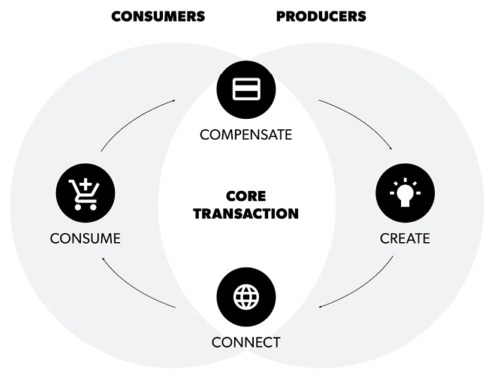Digital Platform Businesses
 Image courtesy of ColoradobizOpens in new window
Image courtesy of ColoradobizOpens in new window
Platform businesses connect and enable users to both create and consume something of value. A platform-based business is a giant change from traditional businesses that use a supply chain and operational processes to make and sell products and services. |
What is a Platform Business?
To define what is a platform business, it is vital we understand what the term platform actually mean. At the very basic level, it appears that the term platform is often used to define ‘something upon which one can build/put something else.’
- A physical representation could be a plank, a raised floor or a pair of shoes with thick soles, such as the ones often worn by Lady Gaga.
- A figurative use could be a political platform or even a technological one.
Those are the very generic use of the term, and we believe a more precise definition is required for what we refer to as a “platform business model”, such as eBay and the likes.
In the field of academia, the term is primarily used by three different types of scholars:
- Those concerned with the development of products. A manufacturer might, for example, say that ‘the Jaguar X-Type uses the same platform as the Ford Mondeo’ or ‘74X Boeing planes share the same platform’.
- Those concerned with technology. An engineer might, for example, say that the Intel platform benefitted from the replacement of DOS by Windows.
- Those concerned with economic transactions. Economists might, for example, say that eBay is a platform operating in a multisided market and enabling transactions between different consumer groups.
A platform is a business creating significant value through the acquisition, matching and connection of two or more customer groups to enable them to transact.
As illustrated in Figure XI, a platform is a business model that creates value by facilitating exchanges (connections) between people in two or more interdependent groups, usually consumers and producers. To encourage exchanges, platforms create communities that allow users to interact directly with one another via their digital media device.
 Figure X1 | A Platform Business Model
Figure X1 | A Platform Business Model
|
Now that we have a clear understanding of the meaning of the word platform, we now propose to define platform businesses.
Platform businesses are businesses creating significant value through the acquisition and/or matching, interaction and connection of two or more customer groups to enable them to transact. Examples include: eBay, Airbnb, Uber, Alibaba, to name a few.
Uber, the world’s largest taxi company, owns no vehicles. Facebook, the world’s most popular media owner, creates no content. Alibaba, the most valuable retailer, has no inventory. And Airbnb, the world’s largest accommodation provider, owns no real estate. Something interesting is happening. To Goodwin
Platform businesses such as Facebook, Uber, eBay and Airbnb do not create and control inventory via supply chain in the same way that linear, or pipe, organizations do. Instead, successful platforms facilitate connections by dramatically reducing the cost of exchanges between producers and consumers.
As a business, a platform allows users to create value on the platform for other users to consume. In a platform-based organization, producers and consumers are connected via digital technology (computers, smartphones).
The owners of the platform businesses provide the software and the central processing computers that connect other people into a self-sustaining system. The users both create and consume any product or service.
The owners of the platform can earn money by charging a fee for the transaction or by exposing users to advertising.
Using eBay as an example, let’s say that you have a large table with matching chairs that no longer fits with your newly redecorated flat. For you, this second-hand furniture almost has a negative value; it takes up space, and given the very reasonable price you paid for it at IKEA several years ago, you don’t want to spend time trying to find somebody to take this set off your hands.
Conversely, think about a nearby student who has a tight budget and is looking for a table and chairs for her new pad. She wants to save money and doesn’t care about “new” stuff. The student is prepared to pay $70 for the entire set.
eBay can match you and this potential buyer, with very limited friction. Let’s say the student’s bid of $50 is the highest and that she is the happy winner of the auction.
The value created by the platform intermediation is then $20 ($70 willingness to pay minus $50 winning auction bid) for the buyer plus $55 for the seller (that’s the $50 plus the negative price you were attaching to the no longer adequate table set that was taking up space: say $5).
So out of “thin air”, the platform managed to create $75 of economic value. Now scale this by millions of transactions every day across all the platform companies (including car and house rental companies, e-commerce marketplaces, etc.) and you get a sense of the transformational potential of platform businesses.
Platform businesses have become mainstream. AirbnbOpens in new window, eBayOpens in new window, and UberOpens in new window epitomize the rise of digital platform businesses. In the same way as eBay connects buyers and sellers Airbnb creates communities of hosts and guests and enables them to transact globally.
Unlike traditional businesses, platforms don’t produce anything and don’t just distribute goods or services.
What they do is directly connect different customer groups to enable transactions.
| IN PRACTICE | Uber |
|---|
| Uber is one of the better-known digital platform companies and operates unlike traditional organization forms. Interactions with the company are strictly digital. To get a ride on Uber, you download the app and create an account. When you open the app, your location is detected via GPS. The app also shows nearby drivers on the map. When you agree to the estimated fare, you are connected to an Uber deriver within seconds. The driver receives data on the rider’s previous Uber experience and can accept or reject a request. Uber uses a bidirectional rating system to flush out bad riders and drivers, who can be deactivated. You can track the car on your screen as it approaches. The driver has your desired destination in the built-in GPS. When the ride is completed, the fare is automatically paid through the app. |
A platform business is a giant shift from traditional businesses that use a supply chain and operational processes to make and sell products and services. Knowledge of some economics concepts is useful to understand how platforms differ from more traditional firmsOpens in new window.
Platforms do not create stuff and push it out to customers. The fundamental shift in management thinking is that the amount of physical assets a company owns matters less to its value than the resources it can connect.
Digital platform organizations like Facebook, Alibaba, Uber, Google, and YouTube quickly became among the largest and most profitable companies in the world.
Also in this series include:
- Richard L. Daft and Norman B. Macintosh, “The Nature and Use of Formal Control Systems for Management Control and Strategy Implementation,” Journal of Management 10 (1984), 43 – 66
- Laure Claire Reillier, Benoit Reillier, “Platform Strategy: How to Unlock the Power of Communities and Networks to ...”

